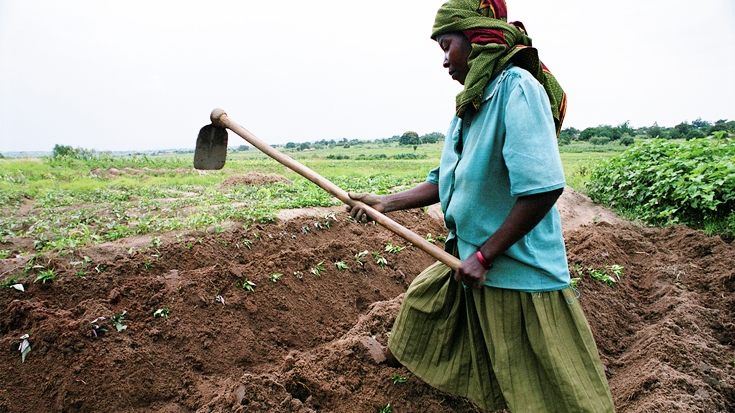Insuring crops against unforeseen weather events is a standard practice among farmers in rich countries. But traditional agriculture insurance and disaster insurance are either unavailable or very expensive in many developing countries, leaving small farmers particularly vulnerable to vagaries of nature.
Without insurance, a severe drought, a devastating earthquake or another extreme weather disaster can wipe out small farmers. Such uncertainties make them more risk averse and less likely to invest in inputs to grow and expand their farms.
This particularly affects women farmers, whose farms already tend to produce less than men’s. In Sub-Saharan Africa, women farmers produce up to a quarter less than their male counterparts, even though they make up a large share of the region’s farmers.
Women farmers’ lack of access to credit and other financial tools to help make their farms more productive is one of the key reasons why their output lags behind men’s.
If women farmers worldwide had the same access to resources as their male counterparts, their yields could increase by up to 30 percent, which could result in up to 150 million fewer people going hungry, according to the Food and Agricultural Organization’s estimates.
Index-insurance, an innovative approach to insuring small farms against weather events, is a step in that direction as it helps stabilize farmers’ income allowing them to continue farming regardless of disaster and weather uncertainties.
Index-insurance is different from traditional insurance. It pays out benefits on the basis of a predetermined index for loss of assets and investments, primarily working capital, resulting from weather and catastrophic events, without requiring the services of insurance claims assessors. A statistical index is developed before the start of the insurance period to measure deviations from normal for such parameters as rainfall, temperature, seismic activity, wind speed, crop yield or livestock mortality rates.
The Global Index Insurance Facility (GIIF), managed by the World Bank Group, has been leading and supporting index-insurance programs since 2009.
Recent examples from Rwanda and Kenya show how to make index-insurance available and affordable in developing countries, particularly for women farmers.
The insurance penetration in Rwanda is less than 1 percent, low even when compared to other developing countries. Landholding is fragmented, making access to credit and risk management tools difficult for most farmers. Since 2012 GIIF, through its partners MicroEnsure and Kilimo Salama (now ACRE), has been aggregating farmers into groups and enrolling them into insurance programs, making this approach commercially feasible for the insurer while allowing women farmers to come together and seek coverage for weather-related risks.
This has provided women with more stable incomes and has empowered them to better provide for their families.
A similar index-insurance arrangement in Kenya showed its value during recent droughts. A payout by the ACRE program, initiated by GIIF and supported by Swiss Re, kept thousands of women farmers in business, providing funds to buy seeds and fertilizers for the next growing season.
GIIF is implementing similar programs across Sub-Saharan Africa, Asia and the Pacific, Latin America and the Caribbean through partnerships with innovative implementers such as PlaNet Guarantee, CARD Pioneer, MicoEnsure, Sanasa and MiCRO and insurers/reinsurers, such as Swiss Re and AXA.
In Haiti, Fonkoze, a microfinance institution and a GIIF implementing partner, is offering affordable weather index-insurance to some 70,000 clients, mostly rural women working in local markets who provide their communities with essential goods and services.
Extending innovative and affordable index-insurance solutions to women farmers increases their access to financial tools allowing them to be less risk averse in managing and growing their farms.
Closing the gender gap and making smallholder farmers in developing countries sustainable is important as agriculture creates jobs throughout the farm-to-table food chain. It is also critical to fighting hunger, tackling malnutrition and boosting food security for the world’s population that is expected to reach 9 billion by 2050.

